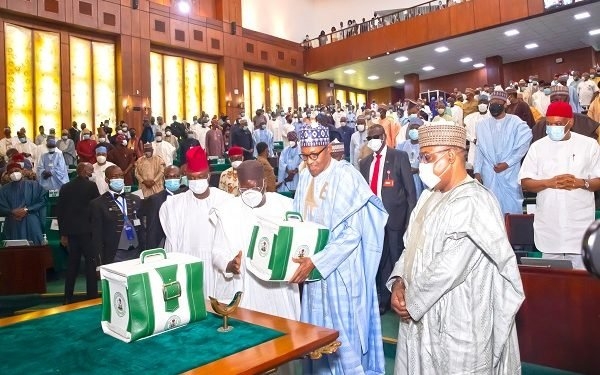From all indications, 2021 is going to showcase another wave of increased taxes as President Muhamnadu Buhari proposes another 2020 Finance Bill to midwife the 2021 Budget.
Recall that while making the 2021 Budget presentation to a joint session of the National Assembly, last Thursday the President said an accompanying Finance Bill will soon be submitted to lawmakers through the Minister of Finance.
Buhari in his budget speech said” I have directed the Minister of Finance, Budget and National Planning to finalise the Finance Bill 2020, which will be forwarded for your kind consideration and passage into law, shortly after today’s 2021 Budget presentation. The Finance Bill is to support the realization of our 2021 revenue projections, adopt appropriate counter-cyclical fiscal policies and enhance the efficiency of fiscal incentives.
The 2019 Finance Bill passed by the National Assembly gave birth to an increase in VAT from 5percent to 7.5percent and various taxes across board.
The Finance Act amends some key provisions of the Companies Income Tax Act (CITA), Value Added Tax Act (VATA), Personal Income Tax Act (PITA), Petroleum Profit Tax Act (PPT), Stamp Duties Act and the Customs, Excise Tariff Etc (Consolidation) Act. Some of the prominent amendments effected by the Act include:
- the increase of the VAT rate from 5% to 7.5%;
- the introduction of a N25 million VAT compliance threshold;
- the exemption of companies with less than N25 million annual turnover from payment of CIT;
- expansion of the scope of companies taxable in Nigeria to include companies that operate within the Nigeria digital space, among others;
- requirement of a tax identification number for opening of bank accounts or continue operation of existing bank account;
- provision of exceptions for the application of excess dividend tax under Section 19 of the CIT Act; and
- imposition of excise on certain imported products.
The Act sets five strategic objectives, which include: raising government revenue through various fiscal measures, reforming domestic tax laws to align with global best practice, promoting fiscal equity by mitigating instances of regressive taxation, supporting small business entities in line with Ease of Business Reforms and introducing tax incentives for investments in infrastructure and capital market.
The budget which was largely condemned by some top Nigerian politicians was described as not being in alignment with Nigeria’s economic reality.
Some lawmakers who spoke to TNG under the condition of anonymity roundly condemned the move as it would lead to more taxes on the over burdened Nigerians.
A lawmaker from the South East geo-political zone described the budget as a recipe for corruption.
He said the Finance Bill is another method to impose more taxes on Nigerians.
Another Lawmaker from the North Central geo-political zone while reacting to whether the 2020 Finance Bill would not lead to fresh increase in the tarrifs of essential services in the country said:
“You don’t need a soothsayer to know what is coming. Once you are shying away from taking actions you need to take, mop up, reduce leakages. Let me quote the president at Chattam house 2014, he said what do I need presidential air fleet for, these are the leakages we need to plug, has he done that, no.
“I agree with the president that there are leakages we need to plug and as a nation if we do not do that we will continue to come with finance bill because you are already looking for where to get more money because of the pressure on you to do certain things and because there is pressure on you and you are blinded to one area so your focus will always be presenting finance bill.
Until holistically as a nation, we look at how resources are being managed and reduce the tendency to borrow.
I was sharing with my colleague, in Nigeria we have five aides and the Nigerian public believe it is too much but an average rep in America has nothing less than 50-60 aides, some have 100+.
All these bilateral funds that we are wasting into travels and what have you, if it is channeled towards such thing to provide the required support, it might not be finance by our national budget so as to be able to deal with this budget effectively our expertise from virtually every sector of the economy, because I am a legislator does not make me have all the knowledge.
Until we begin to streamline those things and cut cost where you need to cut cost these finance bills will be coming and because a man cannot give what he doesn’t have, you will be surprised too that some of them will pass.
I pray we will be able to provide the requisite knowledge and expertise and advice and I pray that they will take such advice. But as it is that finance bill is coming for such purpose.
And these are things that drive economy and this is where the CBN has come below expectations. You do not drive a mercantile economy and expect production. Mercantile economy is where you’re just looking for quick grasps.








